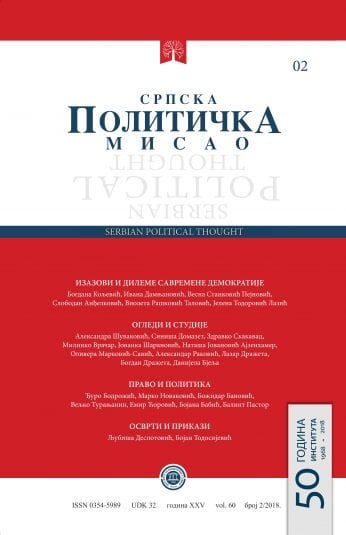Мултикултурализам савременог друштва и национални идентитет
Multiculturalism in Today’s Society and National Identity
Author(s): Sanja Stošić, Aleksandar ĐorđevićSubject(s): Nationalism Studies, Politics and Identity
Published by: Институт за политичке студије
Keywords: multiculturalism; culture; fluid borders; national identity; immigration
Summary/Abstract: Socio-political, economic and cultural changes, conditioned by the concept of neoliberalism adopted by the most developed Western countries, have brought into question the significance of national borders and have increased the level of their permeability. Undermining primarily the economic as well as the political and cultural sphere of society, the mechanisms of contemporary neocolonialism go beyond the boundaries of national identity and lead inevitably to its cultural and ideological reconstruction and deterritorialization. The aim of this paper was to analyze the multiculturalism in today’s liberal democratic states through the political and cultural prism, as well as the challenges brought by the intensified migration, the development of fluid borders and the eventual transformation of national identity. As a result of the above mentioned phenomena, the paper has asserted that the traditional concepts as the “politics of recognition” and the “politics of difference”, which are based on culture as a key factor, are increasingly becoming marked by the rise of a radical populism as the dominant aspect of actual political discourse. In this regard, today’s multiculturalism represents a failure of the integration model of different cultural and ethnic groups into modern and developed states. Globalization involves cultural pluralism, natural deterritorialization as well as the turbulence of migration, which are, in turn, directly related to adaptation and survival of the multiculturalism. Despite of its imbalances, the issue of multiculturalism is strongly affeceted by requirements for the recognition of different cultural and ethnic groups into the nation-state. In that sense, the nature of national identity becomes changed, but, paradoxically, strengthened, so we should bear in mind the importance of multiculturalism and immigration as key issues in contemporary reconstruction of the ethnicity. Reflecting the complexity of international relations as well as the nature of refugee migrations, we highlight the economy and religion-based impact, so as the tendency of political parties to define their programs through hostile and xenophobic attitudes, giving rise to discrimination and shift to increasing tensions within the receiving societies. Hence, in many European countries anti-immigrant rhetoric disseminates in the public discourse, targeting immigrants, especially Muslims, as sources of potential danger to society. Nevertheless, while the ethnic groups are mainly concerned to ensure social recognition of their cultural peculiarities, the ethnic minorities more frequently promote the self-governing, autonomous position of the so-called “micro-nation” at the subnational level. Accordingly, in current Western societies immigrant communities are considered to pose a threat to national values, so it is necessary for contemporary multiculturalism to adopt some new strategies of transnational social relations.
Journal: Српска политичка мисао
- Issue Year: 2018
- Issue No: 3
- Page Range: 175-194
- Page Count: 20
- Language: Serbian

